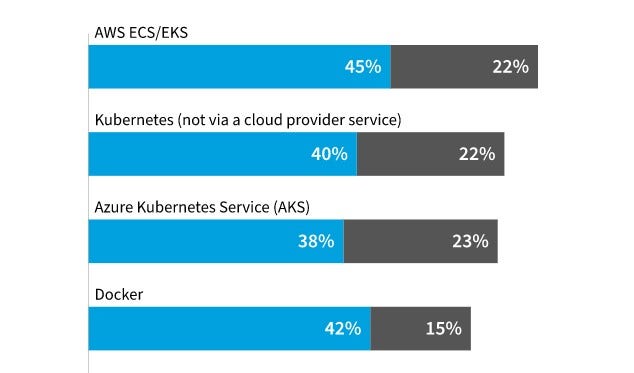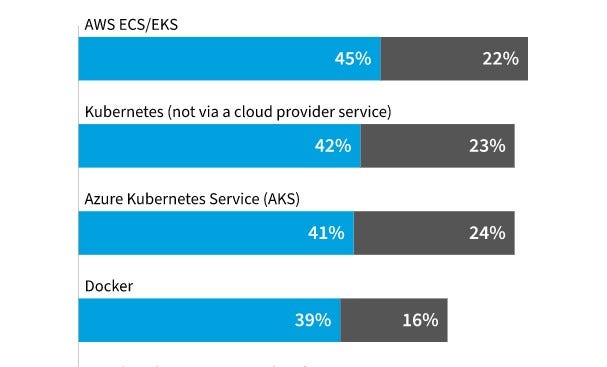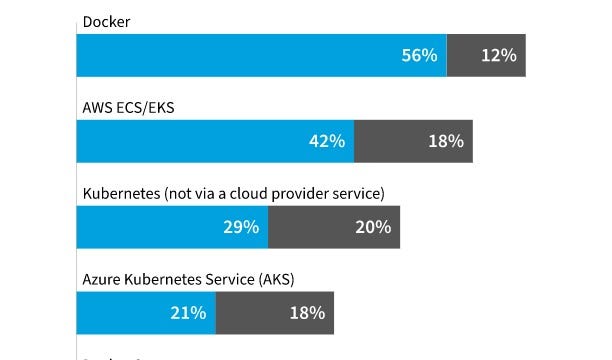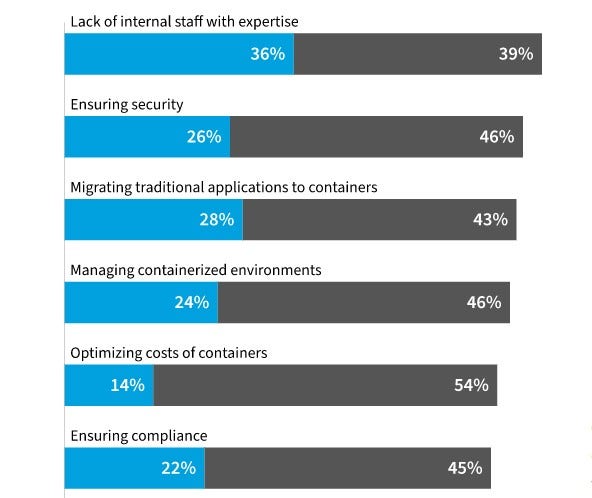Docker Vs. AWS ECS Vs. Azure Vs. Kubernetes: Container Face-Off
Here’s a head-to-head on which container tools businesses are using the most in 2023 based off a new Flexera survey around Kubernetes, AWS ECS/ESK, Docker and Azure Kubernetes Services.

Enterprises and SMBs are selecting AWS ECS and EKS, Docker, Azure Kubernetes Services and self-implemented Kubernetes as their container tool of choice, according to a new Flexera report that surveyed 750 organizations.
“Kubernetes use continues to dominate [the container industry], whether self-implemented or via a cloud provider service,” said Flexera in its new 2023 State of the Cloud Report.
However, there are some differences between SMBs—who prefer Docker—compared to enterprises, who are currently picking AWS ECS and EKS as their container solution.
Flexera’s new 2023 State of the Cloud Report sheds light on what 750 businesses are currently using and are planning to leverage for their container tools. The 750 surveyed are executive leaders and IT professionals from companies mostly in the United States and Europe.
[Related: 6 Big Cloud Computing Trends In 2023: Costs, Hybrid Cloud, Economy]
Container Leaders: AWS, Microsoft, Docker
Flexera’s results showcase the leading container tools being leveraged in 2023 by these 750 businesses, which are: AWS’ ECS and EKS, Microsoft’s Azure Kubernetes Services (AKS) and Docker. Self-implemented Kubernetes, not a service via a cloud provider, is also high on the list.
AWS EKS (Elastic Kubernetes Service) is Amazon’s managed service that customers use to run Kubernetes on AWS infrastructure, while AWS’ ECS (Elastic Container Service) is a container orchestration service provided by the cloud giant.
Microsoft’s AKS is a Kubernetes service aimed at simplifying deploying a managed Kubernetes cluster in an Azure environment.
Docker owns a platform designed to help developers build, share and run modern applications. Docker packages software into standardized containers, with offerings that can run in any environment—from on-premises Kubernetes to the cloud including on AWS and Azure.
Here are the results for container usage for AWS ECS/EKS, Docker, AKS and Kubernetes in 2023, as well as businesses top container-related challenges in today’s market.

All Respondents Use Of Container Tools
AWS ECS/EKS: 45 percent
Docker: 42 percent
Kubernetes: 40 percent
Azure Kubernetes Services: 38 percent
Kubernetes use continues to dominate the container world, whether self-implemented or via a cloud provider service like AWS or Azure.
Out of the 750 respondents, 45 percent are currently using AWS ECS or EKS, followed by 42 percent using Docker, then 40 percent using Kubernetes not from a cloud provider, and Azure Kubernetes Service (AKS) at 38 percent.
In terms of what container tools respondents are planning to use, approximately 23 percent expect to use AKS, followed by AWS, Google Kubernetes Engine (GKE) and non-cloud provider Kubernetes tools—all at 22 percent.
The respondents who currently use a managed Kubernetes service, such as AWS EKS or AKS, essentially remain unchanged from 2022, according to Flexera data.

Enterprise Use Of Container Tools
AWS ECS/EKS: 45 percent
Kubernetes: 42 percent
Azure Kubernetes Services: 41 percent
Docker: 39 percent
Enterprise respondents reported currently using AWS ECS/EKS the most at 45 percent, followed by non-cloud provider Kubernetes with 42 percent, then AKS at 41 percent, and Docker at 39 percent.
Organizations are planning to leverage provider-specific, purpose-built tools along with growing interest in AKS and Google Kubernetes Engine (GKE), according to Flexera.
In terms of what container technology enterprises are planning to use, 24 percent plan to leverage AKS, followed by 23 percent for GKE and non-cloud provider Kubernetes, then 22 percent for AWS ECS/EKS. Only 16 percent of enterprise respondents are planning to use Docker.

SMB Use Of Container Tools
Docker: 56 percent
AWS ECS/EKS: 42 percent
Kubernetes: 29 percent
Azure Kubernetes Services: 21 percent
Although Docker ranks fourth in the enterprise for container usage, it thrives in the SMB market.
Approximately 56 percent of SMB respondents are currently using Docker, followed by 42 percent using AWS ECS/EKS, 29 percent leverage Kubernetes not via a cloud provider, then 21 percent using AKS.
In fact, Docker is so popular with SMBs that Docker Swarm ranked fifth place in Flexera’s results with 11 percent of SMB respondents currently using Docker Swarm, with 9 percent of respondents saying they plan to use Swarm.
Looking at what SMB respondents plan to use for container tools, 20 percent are planning to leverage Kubernetes, then 18 percent planning to use AWS ECS/EKS or AKS, followed by Docker at 12 percent.
This means 67 percent of SMB respondents are currently using Docker or Docker Swarm for their container strategy.

Biggest Container-Related Challenges
Lack Of Internal Expertise: 36 percent
Migrating Traditional Apps To Containers: 28 percent
Ensuring security: 26 percent
Managing Containerized Environments: 24 percent
Ensuring Compliance: 22 percent
The 750 respondents were asked the question, ‘What are the top container-related challenges for your organization?’
Respondents labeled these challenges either ‘very much a challenge’ (in blue) or ‘somewhat of a challenge’ (in gray).
Organizations named lack of internal staff with expertise, migrating traditional applications to containers, and ensuring security as very much a challenge related to container use.
In terms of somewhat challenging, respondents pointed to optimizing costs of containers at 54 percent, followed by ensuring security and managing containerized environments both at 46 percent, then ensuring compliance at 45 percent.
Organizations continue to struggle with costs and hiring, while migrating traditional applications to containers is more problematic as traditional apps aren’t implemented via microservices, which are more aligned to containerized deployment models.
Overall, approximately 75 percent of respondents are having some challenges with having internal staff with the container expertise.